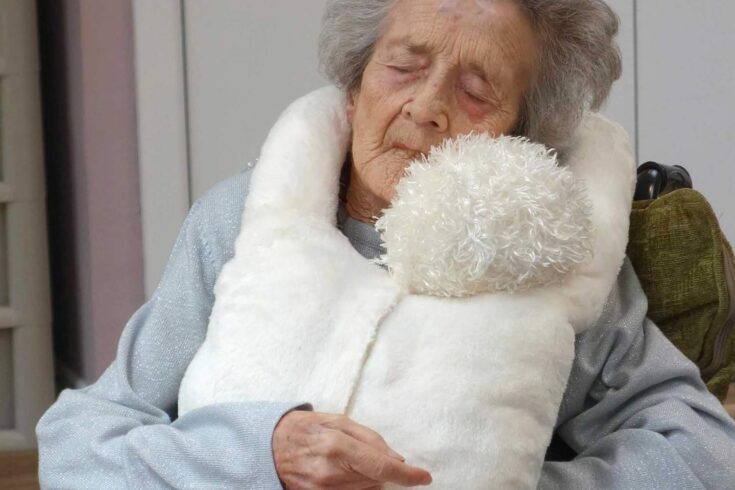Although scientists are working hard to find a cure for dementia, until they do there are an estimated 46 million people around the world living with the condition. Many of them have little to do and often become agitated and distressed.
People living with advanced dementia often become withdrawn, depressed and ‘locked in’. But play can offer a way back out, according to a remarkable multidisciplinary project based at Cardiff Metropolitan University and funded by the Arts and Humanities Research Council (AHRC).
The key to the project’s success has been keeping the individual living with dementia at the heart of the design process.
About the project
Professor Cathy Treadaway leads the Ludic Artefacts Using Gesture and Haptics (LAUGH) project, an international collaboration with researchers at:
- University of Technology Sydney
- Coventry University
- Cardiff Metropolitan University.
During a visit to a dementia care home, she was told by one of the carers that Thelma, in her late 90s and suffering from advanced dementia, “needs a hug”. The fundamental need to be nurtured was one of the key factors identified by dementia experts during the project’s design workshops, and that’s what the LAUGH project focused on.
Comfort toys for those living with dementia
Thelma spent most of her time in bed, barely opened her eyes, and seldom spoke. Informed by dementia experts’ observation that those suffering from the disease need nurturing, the LAUGH team designed a soft, baby-shaped toy with weighted limbs which Thelma could hug and that would hug her back.
Named HUG, the toy also had cleverly hidden electronics inside that made her experience a personal one, with a playlist of Vera Lynne songs and an electronic ‘beating heart’.
Another significant outcome of HUG was the way it helps those who are visiting someone with memory impairment. Keeping conversations ‘in the moment’ can be challenging, and it can be difficult to know what to talk about. HUG can provide a focus for conversation.
Experiential play for those with memory impairment
For a former roadside recovery driver and mechanic who now has dementia, the LAUGH researchers developed a ‘steering wheel’. This has a slight vibration to simulate a running engine, and provides the sensation of driving a car. It has working indicators with lights, and a tune-in radio that plays a personalised playlist of favourite songs.
“It was a huge success. He may not have been able to remember driving, but somehow the experience was still there with him,” says Professor Treadaway.
Impacts of the project
The HUG comfort toy fills a gap in care. It offers opportunities for laughter, fun and joy that can make all the difference to someone living with dementia.
When Thelma was given her HUG she didn’t open her eyes, but she nestled her head into it and was clearly enjoying the experience. She became distressed when her carers later tried to take it from her, and so they left it with her and she kept it. A week later, Thelma had opened her eyes, and after a month she was eating, talking, and had even been socialising with other residents. Within three months her health and quality of life had improved significantly, and she did not fall as often as she used to.
The success of the LAUGH project is being built upon with further funding from the Welsh government in collaboration with NHS and Sunrise Senior Living. The next phase includes a much larger study to evaluate the health benefits of HUG on people living with dementia and cognitive impairment after stroke.
The team are also continuing to develop new playful products using the ‘compassionate design’ methodology which has evolved through the research.
Find out more
Read more about the LAUGH project.
Read about LAUGH on Gateway to Research.
Visit the HUG by LAUGH website.
Learn about how design can lead to a better world for people living with dementia on the Compassionate Design website.
Top image: A woman with dementia takes comfort from a HUG. Credit: LAUGH project.

